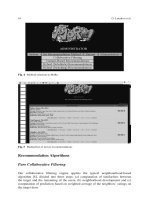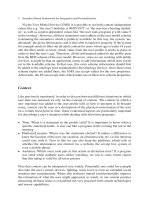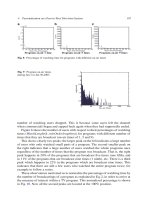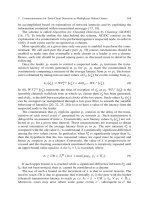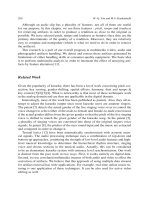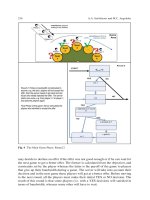THE HANDBOOK OF REGULATIONS FOR DIRECT FARM MARKETING “THE GREEN BOOK” docx
Bạn đang xem bản rút gọn của tài liệu. Xem và tải ngay bản đầy đủ của tài liệu tại đây (1.03 MB, 125 trang )
THE HANDBOOK OF REGULATIONS FOR
DIRECT FARM MARKETING
“THE GREEN BOOK”
FIFTH EDITION
UPDATED 2006
A PUBLICATION OF
THE WASHINGTON STATE DEPARTMENT OF AGRICULTURE
SMALL FARM & DIRECT MARKETING PROGRAM
The fifth edition of this handbook was prepared by
Leslie Zenz, Kelli Sanger and David Wides
Small Farm & Direct Marketing Program
Washington State Department of Agriculture (WSDA)
To receive additional copies of this Handbook, contact:
WSDA Small Farm & Direct Marketing Program
P.O. Box 42560
Olympia, WA 98504
(360) 902-1884
Also, the Handbook of Regulations for Direct Marketing is available for download in
Adobe PDF format on the WSDA Website:
/>
AGR PUB 056 (R/6/06)
Inquiries regarding availability of this publication in alternative formats should be
directed to the WSDA Receptionist at (360) 902-1976 or
Telecommunications Device for the Deaf (360) 902-1996.
Note: The information included in this handbook is current at the time of publication.
However, laws and regulations can change frequently. Please refer to the contacts listed
for the most up-to-date information on requirements and fees.
Valoria H. Loveland, Director
Many people contributed to the editing of this handbook.
The Small Farm & Direct Marketing Program wishes to thank these individuals and
organizations for their comments, suggestions, patience and other editorial support:
Claudia Coles, WSDA Food Safety Program
Linda Condon, WSDA Food Safety Program
Mariah Cornwoman, CW Ray LLC.
Denise Curette, WSDA Food Safety Program
Chris Curtis, Seattle Neighborhood Farmers Market Alliance
Dave Gifford, Department of Health
Jennifer Hall, WSU Extension Spokane County
Rachael Jamison, WSDA Organic Food Program
Karen Kinney, Seattle Neighborhood Farmers Market Alliance
Zachary Lyons, Washington State Farmers Market Association
Chrys Ostrander, Chrysalis Farm of Tolstoy, Davenport, WA
Jim Pressley, WSDA Food Safety Program
Jim Quigley, WSDA Fruit and Vegetable Inspection Program
Mark Savage, Washington State Department of Natural Resources
Ned Therien, Department of Health
Jim Thompson, Public Health of Seattle/King County
John E. Wack, Dept. of Revenue
Cascade Harvest Coalition
Chef’s Collaborative
Washington State Farmers Market Association (WSFMA)
Washington State University Small Farm Program
Washington State University Small Farms Team
Washington Sustainable Food and Farm Network
Washington Tilth Producers
ii
Table of Contents:
PREFACE V
SMALL FARMS AND DIRECT MARKETING VI
About This Handbook vii
Definitions and Terms viii
WSDA Small Farm & Direct Marketing Program viii
DOING BUSINESS IN WASHINGTON STATE 1
LICENSING 2
TAXATION 5
FARM LABOR 6
INSURANCE 10
DIRECT MARKETING STRATEGIES 13
DIRECT MARKETING OPTIONS 14
FARMERS MARKETS 16
U-PICK AND ON-FARM STANDS 19
AGRI-TOURISM 20
COMMUNITY SUPPORTED AGRICULTURE (CSA) 21
DIRECT TO RESTAURANTS AND RETAIL STORES 23
FARM-TO-CAFETERIA 25
INTERNET MARKETING AND MAIL ORDER 26
SELLING SPECIFIC PRODUCTS 27
EGGS 28
FISH AND SHELLFISH 30
FRESH FRUITS & VEGETABLES 34
HERBAL PRODUCTS 37
HONEY 39
MEAT 40
MILK AND DAIRY PRODUCTS 44
MUSHROOMS 47
POULTRY 48
NURSERY PRODUCTS 51
PREPARED FOODS AND FOOD SERVICE 52
PROCESSED FOODS 53
WINE, BEER AND HARD CIDER 56
iii
LABELING 61
LABELING OF PROCESSED FOODS 62
ORGANIC CERTIFICATION 64
ECO-LABELS 66
WSDA GUIDELINES FOR OTHER LABEL CLAIMS 68
ON MEAT, ANIMAL, AND FOOD PRODUCTS 68
KOSHER 71
HALAL 72
GENERAL TOPICS 75
FOOD STAMPS 76
FARMERS MARKET NUTRITION PROGRAMS 78
WEIGHTS AND MEASURES 80
SIGNAGE 81
APPENDIX: 85
RESOURCES FOR DIRECT MARKETING 86
PUBLICATIONS (by topic):
Advertising 86
Agricultural Tourism 87
Community Supported Agriculture (CSA) 88
Direct Marketing 88
Farm Planning 90
Farm-to-Cafeteria 91
Farmers Markets 92
Flower and Herb Marketing 93
Livestock Marketing 94
Nursery Marketing 96
Produce Marketing 96
Restaurant Marketing 97
Value Added Marketing 98
ORGANIZATIONS 99
LOCAL HEALTH DEPARTMENTS 110
iv
v
Preface
vi
Small Farms and Direct Marketing
Direct marketing has become a highly effective way for small-to-medium sized farms to
achieve economic sustainability. Direct marketing implies marketing strategies in which
the farmer or producer sell their products directly to the consumer. While restaurants,
public institutions, and grocery stores are not considered “consumers”, information about
sales directly to these types of venues are included in this handbook. These strategies
describe marketing in which farmers personally sell their products, avoiding the use of a
broker or a wholesaler and increasing their own revenue potential.
As today’s agricultural markets become increasingly global and competitive, many
smaller-scale farmers are unwilling or unable to compete in wholesale channels. By using
direct marketing strategies as tools, they can ensure their economic viability in the
marketplace. Here are some good reasons why direct marketing is beneficial to farmers:
• Becoming both producer and seller, the farmer can capture more of the retail food
dollar. Be aware, however, that selling your own products requires additional time
and labor that may add costs to your business plan.
• Selling direct to the consumer allows marketing relationships to develop, which will
increase opportunities for repeat sales and increase opportunities to reach new buyers.
Working directly with the consumer allows the farmer to understand first-hand what
the consumer wants and needs, and allows the farmer to respond quickly to these
needs. Additionally, farmers have more control over their products, thus maintaining
quality until it reaches the consumer.
• Direct marketing relationships educate the consumer about the needs of the farmer.
The more people understand about the nature of local food production, the more
likely they will be to preserve the health of local agriculture.
• Filling niche markets through direct sales adds distinction and differentiation to a
farm’s products. Additionally, smaller-scale farms can offer smaller quantities or
unusual products not commercially available through wholesale channels, allowing
them to serve the needs of many restaurants.
• Consumers respond favorably to knowing the person behind the products they are
buying.
There are an increasing number of people who desire locally grown, fresh, and distinctive
products. Likewise, there is a growing awareness of the economic, social, and
environmental contributions of local farms and food production to both rural and urban
communities. Increased interest in healthy eating has also turned the spotlight on fresh,
local produce.
These trends are illustrated by the rising popularity of farmers markets. In Washington,
the number of farmers markets has steadily increased, from 56 markets in 1997 to nearly
100 in 2004. Sales figures for farmers markets are also increasing at 20 percent a year.
Approximately 1,200 farms sell their products at farmers markets each week.
vii
Community Supported Agriculture (CSA) programs, where households purchase a share
of a farm’s harvest at the beginning of the season and receive weekly deliveries,
experienced growth similar to farmers markets. Since the first two CSA farms in 1986,
CSA’s increased to approximately 1,700 across the U.S. in 2004. There are nearly 90
CSA programs operating in the state, making Washington one of the top five states in the
U.S. with the largest concentration of CSA programs.
Direct sales to restaurants and public institutions have also been on the rise. The Chef’s
Collaborative is a national organization committed to educating chefs and the restaurant
community about the importance of purchasing locally produced products and promoting
sustainable agriculture. Northwest chapters of The Chef’s Collaborative are some of the
strongest, most active chapters. Programs linking universities and public schools to local
farms (Farm-to-Cafeteria) are emerging as another strategy to support local agriculture,
while providing fresh, nutritious food to students. Currently there are 78 Farm-to-
Cafeteria programs operating throughout Washington.
Every farm has its own way of producing crops and animals, and likewise, each farm will
develop its own unique marketing plan. The economic viability of a farm is more
probable if the farm’s marketing plan includes multiple strategies. Diversification of
marketing strategies allows more flexibility and stability should one marketing strategy
hit a downturn. Many small farms attend farmers markets, often several each week, in
addition to having a CSA program and/or on-farm sales. Also, farms may employ a
broker or wholesale option for one or more crops. The adage “sell before you sow” is,
indeed, a wise one. Develop a detailed marketing plan along with your production plan,
taking into account for labor, transportation, cooling, packaging costs, and fees associated
with the strategy you choose. A well-developed marketing plan is often what
distinguishes a successful farm from one that struggles to make ends meet. Understand,
too, that your marketing plan is dynamic and may change from year to year as you find
success in one area or a new opportunity in another. Adaptability, remaining attentive to
consumer buying trends, being creative, and trying new ideas are keys to success.
About This Handbook
This handbook is designed to help farmers become familiar with Washington State
regulations associated with direct marketing of farm products. By providing producers
with regulatory information, the State Department of Agriculture can help ensure
compliance with food safety and licensing policies, facilitate the use of direct marketing
strategies, and promote localized food systems. While the handbook describes various
direct marketing strategies, it is designed to serve as a point of departure only. There are
many resources available to assist small farm businesses successfully direct market their
products. Many of these are listed in the Appendix.
The provisions summarized in this handbook are found in state law. This handbook is an
overview of those laws, but not a complete description. If there are any conflicts between
what is written in this handbook and what is contained in the law, the applicable law
prevails.
viii
Definitions and Terms
The following terms are used throughout this handbook. These definitions apply for the
language used in this handbook.
Direct-to-Retail Sales: Farmers sell their product to a business that will “re-sell” their
product at the retail level. This includes sales to restaurants, retail grocery stores, and
public institutions.
Farmers market vendor: A farmer or broker. Although this handbook is designed to
include use by farmers market managers, it does not provide information about craft
vendors/artisans.
Retail sales: The farmer sells product to the end-user. This includes farmers markets,
CSA’s, on-farm sales, Internet sales and farm stand sales.
Wholesale sales: Sales to wholesale produce companies, processors, or packing houses.
RCW: The Revised Code of Washington, a statute enacted by the state legislature as law.
WAC: Washington Administrative Code, a rule adopted by a state agency.
WSDA Small Farm & Direct Marketing Program
The Small Farm & Direct Marketing Program’s mission is to increase the economic
viability of small farms, build community vitality, and improve the environmental quality
of the region by facilitating direct marketing opportunities and addressing direct
marketing barriers for small farms in Washington. This program was established to serve
the needs of small-scale farms through projects which:
• Assist farmers with understanding current marketing regulations;
• Address barriers in marketing regulations;
• Assist in developing infrastructure necessary to market farm products;
• Assist in farmers market development;
• Promote localized food systems, and;
• Provide a voice for small-scale agriculture within state government.
The program was created in 1999 with grant funding from the U.S. Environmental
Protection Agency (EPA) and from USDA’s Sustainable Agriculture Research and
Education Program (SARE). The WSDA Organic Food Program provided a financial
match.
ix
Legislation establishing the program in state law was enacted in June 2001 with funding
provided in the state budget. Additional funds have come from USDA’s Initiative for
Future Agriculture and Farming Systems (IFAFS) for a project researching small farm
direct marketing opportunities in Washington, Oregon, and Idaho and USDA’s Risk
Management Agency.
For more information about the WSDA Small Farm & Direct Marketing Program, visit
www.agr.wa.gov/marketing/SmallFarm or contact:
Kelli Sanger, Program Coordinator Fred Berman, Program Coordinator
P.O. Box 42560 P.O. Box 42560
Olympia, WA 98504 Olympia, WA 98504
(360) 902-2057 (360) 902-1884
E-mail:
E-mail:
x
1
Doing Business in Washington State
2
Licensing
Master Licensing Farms that have a gross annual income of $12,000 or more must
obtain a business license (herein referred to as Master License) in
the State of Washington.
Under Washington state law (RCW 36.71.090), no city or town can
pass or enforce an ordinance prohibiting the sale of farm produce
(except dairy, meat, poultry, eel, fish, mollusk, or shellfish)
directly from the producer to the end consumer, nor can they
require a Vendor’s License of that producer. However, this law
does not prohibit the state from requiring such a license and,
indeed, farms in Washington state that sell their products either
retail (farmers markets, CSA, u-pick, etc.) or wholesale
(restaurants, grocery stores) are subject to B&0 taxes and must
have a Master License.
This law does not prohibit health regulations regarding the
handling of produce, nor does it restrain the state from adopting
regulations governing the sale of farm produce.
Farm businesses obtain a Master License from the Department of
Licensing, which provides a tax registration number. This number,
referred to as a Unified Business Identifier (UBI) number, allows
the business to purchase supplies (fertilizer, tools, jam jars, etc.)
from wholesale outlets and other stores without being taxed. This
can amount to significant farm savings.
You can apply for a Master License under your own name, (i.e.
“Jane Doe”) or register a business or trade name, (i.e. “Jane Doe’s
Apple Orchards”,) on the Master License application.
You can find out if a trade name you want to use is already
registered to another business by requesting a search from the
Master License Service at the Department of Licensing. Fees for
searches vary for phone or mail requests and depend on the
number of names searched.
A farmers market may be covered by one Master License that
allows the market to operate a consignment booth among other
activities. Many farmers markets, however, require farmer vendors
as well as craft vendors and other vendors of non-agricultural
products to have their own Master Licenses.
3
Agriculture
Addendum An “Agriculture Addendum,” available in your Master License
application packet, must accompany your application if:
• You are an egg dealer or handler;
• You have a refrigerated locker;
• You are a pesticide dealer; or
• You are a nursery wholesaler or retailer.
Master Licensing Fee: $15.00, one time fee
Registration of Trade Name: $5.00 per name
Other fees may apply.
Contact: Washington State Department of Licensing
Master License Service (MLS)
P.O. Box 9034, Olympia, WA 98507-9034
(360) 664-1400
Many questions about obtaining a Master License
can be answered through the MLS website at:
Reselling Agricultural
Products
It is common in Washington State for people to sell farm products
which they have purchased outright or which they sell on a
commission basis. Many roadside fruit stands are operated in this
way. A few farmers markets allow vendors to sell fruit or produce
obtained from other farms. For instance, markets on the west side
of the Cascades may have vendors selling fruits or other products
that they have acquired from east side farms. Most farmers
markets, however, have guidelines which regulate or disallow this
type of selling. Make sure to check with the market at which you
plan to sell ahead of time.
Vendors who buy agricultural products for resale must hold one of
the following licenses by the WSDA.
A Cash Buyer's License is the most applicable to a farmers
market vendor. Under this license the vendor must pay the grower
for the produce in cash, certified check, bank draft, or cashier's
check. A Cash Buyer's License costs $100.00.
A Commission Merchant's License must be obtained if a vendor
is being paid a sales commission by the producer. This license
requirement also applies to commission booths at farmers markets
or in the case of a grower selling a large quantity of another
grower's product. A Commission Merchant's License costs $450.00
and the licensee must be bonded for an amount based upon the
annual gross dollar of purchases.
4
A Produce Dealer's License applies in situations where a vendor
pays the grower by a personal check or buys on credit. A Produce
Dealer's License is $450.00 and the licensee must be bonded for
$10,000.00.
Licenses for cash buyers, commission merchants, and produce
dealers are valid from January 1 to December 31.
Contact: WSDA
Commission Merchants Program
P.O. Box 42560
Olympia, WA 98504
(360) 902-1854
5
Taxation
Obtaining a
Tax Number Farms which sell their products at retail, such as at farmers markets
or roadside stands, must obtain a tax number (Unified Business
Identifier, or UBI) from the Washington State Department of
Revenue. Farms must file their tax returns, according to
requirements, even if the total amount of gross sales does not
necessitate a tax. The UBI number is assigned to your business
when you apply for a Master Business License. You are not
required to register with the Department of Revenue, or collect
sales tax, or pay any other tax or fee, if your gross annual income
is less than $12,000.
Two types of taxes are applicable to direct sales vendors: Retail
Sales Tax and Business & Occupation (B&O) Tax. Both of these
are handled on the same form once a UBI is obtained.
Retail Sales Tax Generally, produce, groceries, and other unprepared food products
are retail sales tax exempt. Taxes are applied to sales of meals and
prepared food by the seller regardless of where it is served or
delivered to the buyer, with some specific exemptions. Pet food
and supplies, seeds, and live plants including edible plants, are
considered non-food products and subject to retail sales tax. Seeds
and edible plants, however, are considered exempt from retail sales
tax if purchased with food stamps.
All vendors that are not exempt by the above criteria must have a
UBI number and personally collect tax from customers.
Business &
Occupation Tax Farms conducting retail sales are subject to B&O taxes. For sales
to restaurants, groceries, or other wholesale venues, B&O taxes do
not apply. The basic B&O tax rate for retail sales is .00471 of
gross sales. Smaller farm businesses may find that the state
provides a tax credit for sales under a certain amount. These
amounts are dependent on when and how often you file (monthly,
quarterly, etc.).
Some cities also charge their own B&O tax, usually on the same
criteria as the state.
Contact: Washington State Department of Revenue
Telephone Information Center
Toll Free: (800) 647-7706
6
Farm Labor
Employer's
Identification Any business that hires employees must obtain a federal
Number identification number, called an Employer’s Identification Number
(EIN), by filing Form SS-4 with the Internal Revenue Service
(IRS). An EIN is a number that the IRS uses to identify taxpayers
that are required to file various business tax returns. The federal
identification number assigned to your business will be registered
with the IRS, the Social Security Administration, and the
Department of Labor. Contact the IRS for general information, to
obtain an SS-4 form, or to request an IRS document entitled,
“Understanding Your EIN.”
Contact:
Internal Revenue Service (IRS)
800-829-3676
/>“Understanding Your EIN”:
/>
Unemployment
Insurance Taxes All employers doing business in Washington are liable for
unemployment insurance taxes unless specifically exempted. Tax
liability is determined by the type and nature of your agricultural
business and where the work is performed. This determination is
made by the Employment Security Department once you have
registered your business. Liability begins with your first worker on
your first payroll.
The Employment Security Department participates in the Unified
Business Identifier (UBI) program. Businesses subject to
Washington State taxes can register through the Master License
Program, the Employment Security Department, or the
departments of Revenue, Licensing, or Labor and Industries.
Contact:
Employment Security Department
(360) 902-9360
or
Washington Employer Help Line
Toll Free: (888) 836-1900
7
Worker's
Compensation Employers are required to pay worker's compensation premiums
for employees. This tax assessment is based on the number of
hours worked per particular work classification. This assessment is
determined by a caseworker that is assigned to the employer when
a tax number is issued (with a Master License). Note: Agricultural
operations paying wages to family members over the age of 18
must pay into the Worker's Compensation Fund.
Contact:
Washington State Department of Labor and Industries
Division of Industrial Insurance – Employer Services:
Olympia: 7273 Linderson Way SW
Olympia, WA 98504
(360) 902-4817
Spokane: 901 N. Monroe St., Suite 100
Spokane, WA 99202
(509) 324-2600
Yakima: 15 W. Yakima Ave., Suite 100
Yakima, WA 98902
(509) 454-3700
Social Security For information regarding your Social Security responsibilities for
your employees, contact the Internal Revenue Service.
Contact: Internal Revenue Service (IRS)
(800) 829-1040
Age Requirements
For Agricultural
Workers Farmers are permitted to employ youths at least 14 years of age
outside of school hours. Children of the farm family are exempt
from WAC 296-131 (regulations pertaining to the employment of
minors.) Minor Work Permit Endorsements are required for
employers with minor workers (between the ages of 14 –17).
Before employing a minor, the employer must obtain written
permission from the minor’s legal guardian and the minor’s school
if employment occurs during the school year.
Children 12 and 13 years old are allowed to work only during non-
school weeks and only for hand-harvesting berries, bulbs,
cucumbers, and hand-cultivating spinach.
8
Also, certain duties are considered dangerous and prohibited for
minors in agriculture (WAC 296-131-125). For more information
about these or other labor issues:
Contact:
Local Department of Labor and Industries district (see
above) or;
Department of Labor and Industries Central Office
(360) 902-5316
Wages Employers are required to pay the state minimum wage to workers
age 16 and older. Under the federal Fair Labor Standards Act
(FLSA,) agricultural exemptions to minimum wage and overtime
pay provisions include:
• Ag employees who are immediate family members of the
farmer.
• Persons principally engaged on the range in the production of
livestock.
• Local hand-harvesters who: commute daily from their
permanent residence, are paid piece rate, and were engaged in
agriculture less than 13 weeks during the proceeding year.
• Non-local minors, 16 or under, who are hand-harvesting, paid
piece rate, employed on the same farm as their parents, and
paid the same piece rate as those workers over 16.
Workers under the age of 16 may be paid no less than a determined
percentage of the state minimum (85% of minimum wage in 2001).
Contact the Washington State Department of Labor and Industries
to verify the amount. Workers under 16 may also be covered under
the Federal Minimum Wage Guidelines. Contact the United States
Department of Labor for information.
Employers must maintain records of employees for three years.
Records must include: employee name and address, occupation,
duration of employment, payments made each period, and wage
rate.
Contact:
Washington State Department of Labor and Industries
Employer Help Line: (360) 902-5316
United States Department of Labor
(206) 553-4482
9
Employment
Mediation Mediation services are available for agricultural employers and
employees through the Agricultural Employment Mediation
Program. Mediation can help farmers and farm workers resolve
disputes without the cost and stress of going to court. This informal
service is free and confidential. While the main office is located
in Olympia, services are made available throughout the state and
interpretation is provided in any language needed by the parties
requesting mediation.
Contact:
Agricultural Employment Mediation Program
924 Capitol Way S #106
Olympia, WA 98501
Toll free number: 1-877-943-2700
(360) 943-5406
Employer
Deskbook The Washington Farm Bureau publishes a useful resource for
farmers entitled Employer Deskbook: A Reference Manual for
Agricultural Employment and Labor Issues. Contents include
information on wage and hour law; Migrant and Seasonal
Agricultural Worker Protection Act; worker’s compensation;
retro/safety briefs; and other state and federal laws. Copies are
available for $20.00.
Contact:
Washington Farm Bureau
P.O. Box 2009
Olympia, WA 98507
(360) 357-9975, ext. 116
10
Insurance
Insurance is often one of the most overlooked pieces of running a
farm business. In today’s litigious culture, it is wise to have
adequate coverage for all your farm activities. Insurance coverage
can be found for nearly any activity in which you wish to engage.
However, the cost of coverage may not be economically viable for
your farm. Shop around for the insurance that best suits your
needs, and carefully balance this into your farm business plan.
There are two main types of insurance agents. A captive agent sells
only policies for a particular company. An independent agent can
build a coverage plan from multiple companies. Once you have
established a policy that fits your operation, remember to remain in
contact with your agent anytime you make a change to your
marketing (shift of venue), or production. Don’t assume you will
be covered for a new product or activity simply because it is a part
of your operation or is similar to those for which you already have
coverage. If an activity or product is not spelled out specifically in
your policy, you are not covered for this product.
If your farming operation is very small, you may be able to simply
add coverage to your homeowner’s policy. Larger operations may
require a farm policy that includes property coverage as well as
liability coverage for physical injury and ingested food products. A
farm policy can also cover a roadside stand, whether or not it is on
your property, and may be extended by endorsement to cover a
farmers market stand. Farms that process foods or sell primarily
flowers or other non-edibles may require a Commercial General
Liability policy.
Group policies For groups of producers or businesses that are engaged in the same
enterprise, it may be wise to seek a group policy. For example,
The Washington State Farmers Market Association provides a
group policy for it’s member markets. It covers accidents in which
the market is negligent, which cause injury to customers, vendors
or employees of the market, which cause damage to the property
where the market is held, or a customer’s property. This group
policy does not cover individual vendors for product liability or
other instances where the vendor is liable. Group policies can
often be negotiated at a more economical rate so the cost is lower
to each person insured.
Contact: Your insurance agent or consult the telephone
directory for insurance agents.
11
Other
Considerations When you invite the public onto your farm you should be certain
that you have adequate insurance coverage for any mishaps that
might occur. Activities such as on-farm stands, u-pick crops, farm
tours, or other agritourism related events should all be well defined
within your coverage. There are few exceptions to this. When
landowners invite the public, free of charge, onto their land “for
the purpose of outdoor recreation (specifically defined)”; the
landowner is not responsible for unintentional injuries incurred by
the users (RCW 4.24.210). However, this law does not apply if a
person is charged to enter or make use of the land.
Liability coverage for products that your customers are ingesting is
also important.
The recommended amount of coverage for property and liability is
based on the farm’s net worth and five years of earnings. The
Grange Insurance Agency, for instance, will not insure for less
than $300,000 and recommends $1 million.
Crop Insurance In addition to a farm policy or general liability insurance, farms
may wish to add additional coverage for the production of a
particular crop or to cover any losses due to market fluctuations.
The USDA Risk Management Agency offers information on a
range of crop insurance programs.
In the past, many small-scale operations that produce a wide
variety of crops have not found crop insurance to be beneficial.
However, in 2004, select areas of Washington gained access to a
crop insurance program called Adjusted Gross Revenue Lite
(AGR-Lite). This program covers your revenue losses due to
natural disaster or market downturns for the entire operation (based
on your tax schedule F.) AGR-Lite covers organic and direct
marketing farms as well as more conventional operations.
For information about federal crop insurance or AGR-Lite contact
your insurance agent. For a list of insurance agents in the state visit
the Insurance Provider Directory from the USDA Risk
Management Agency at:
12



